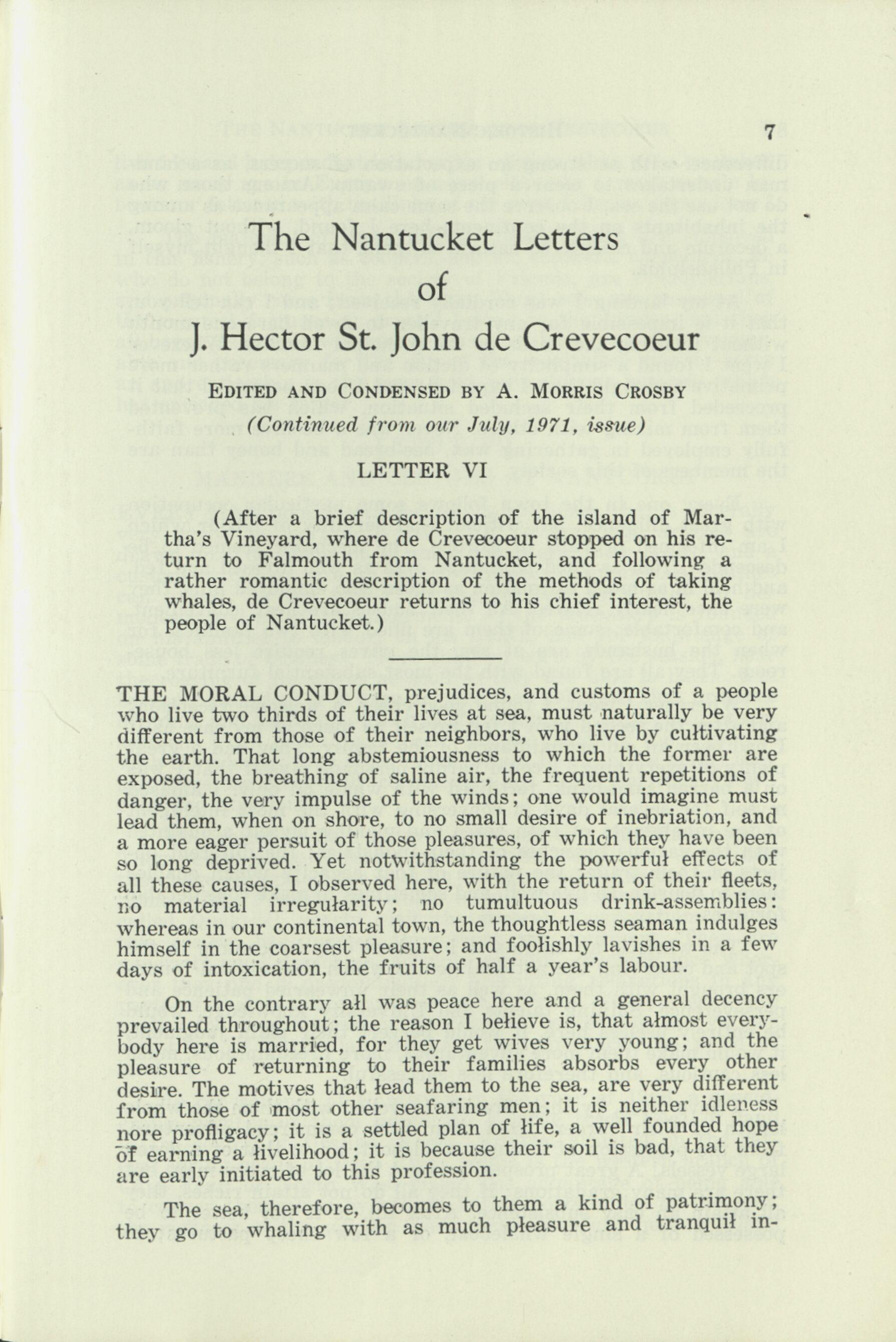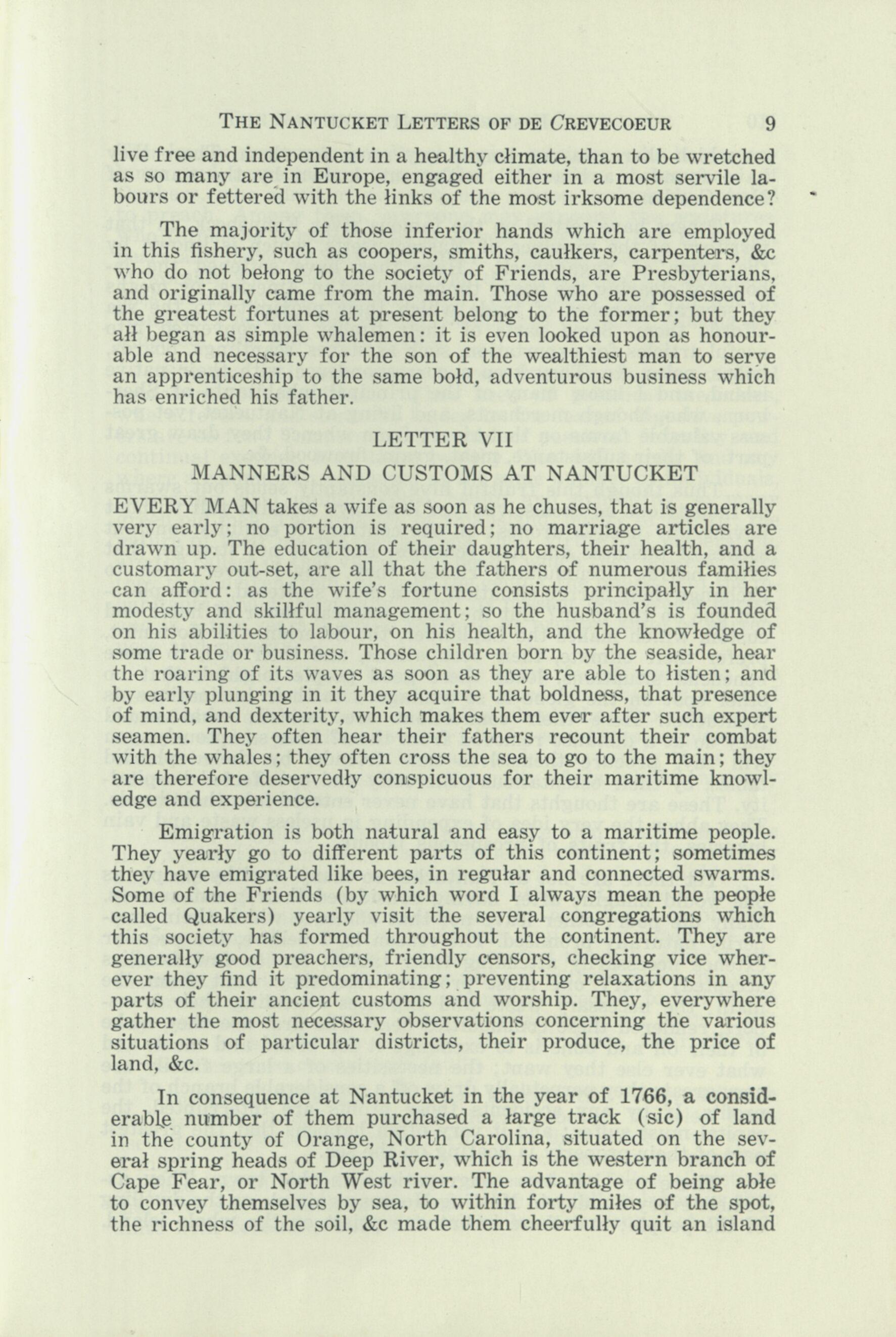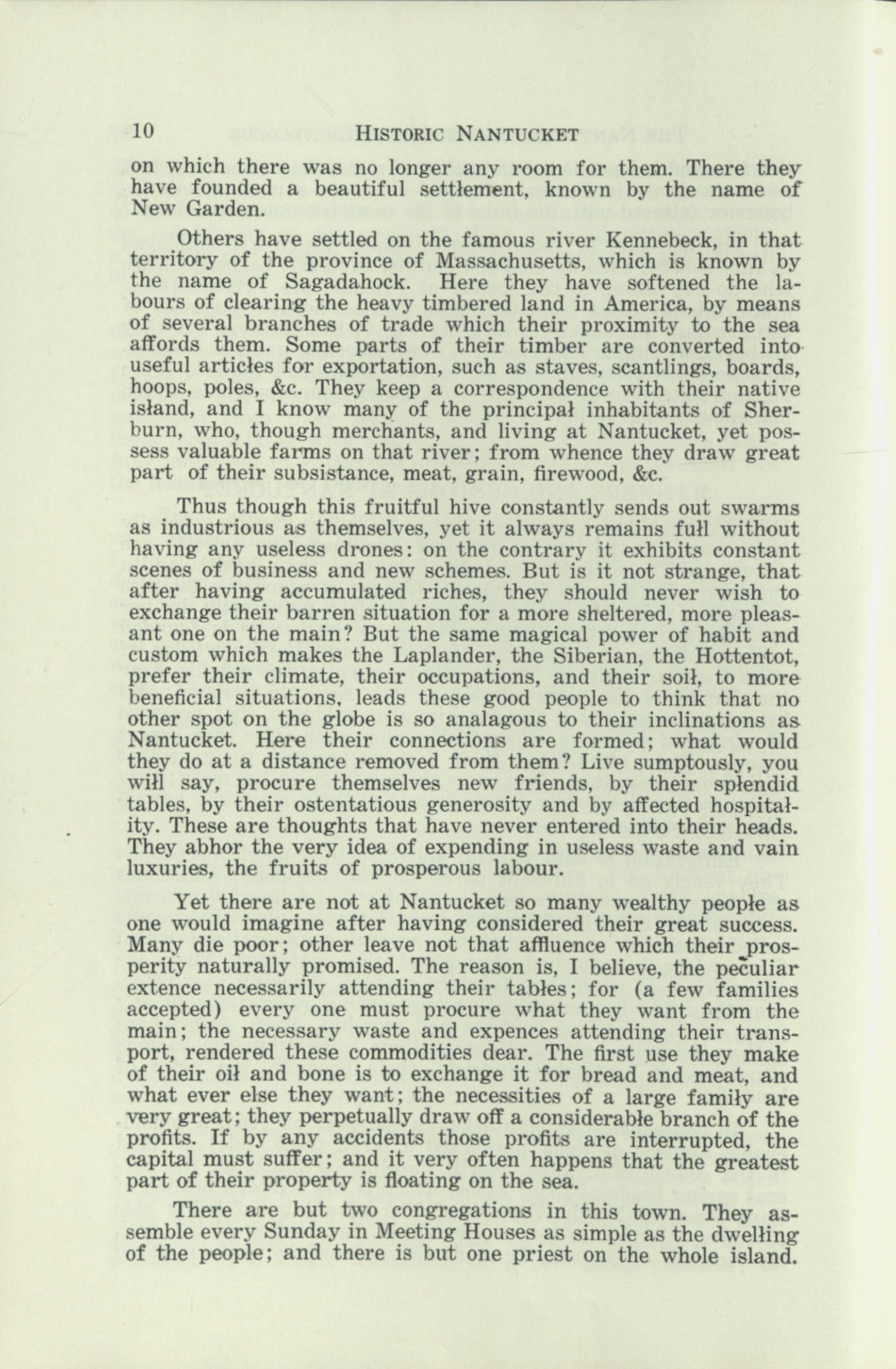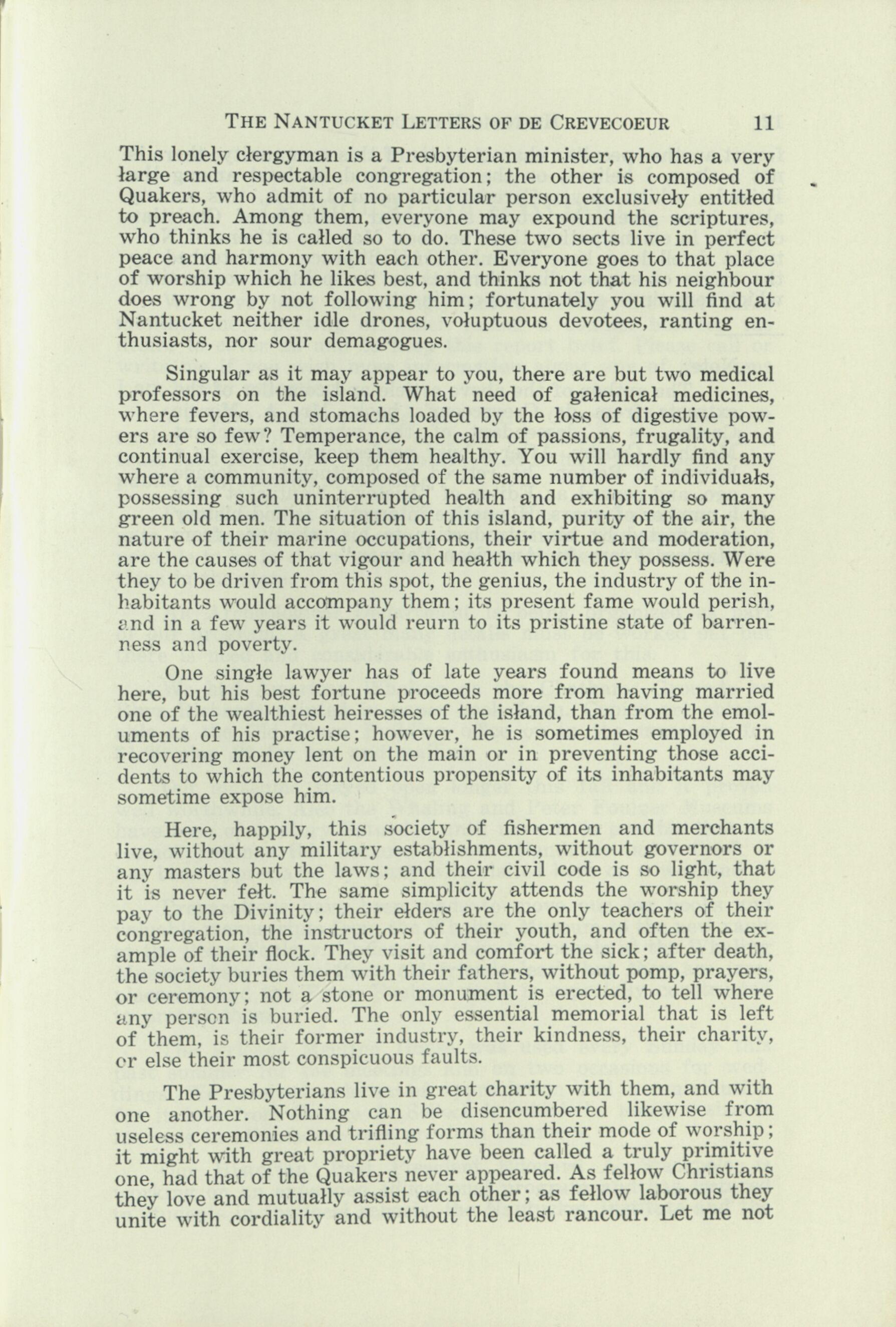
12 minute read
by A. Morris Crosby
7
The Nantucket Letters of ]. Hector St. John de Crevecoeur
EDITED AND CONDENSED BY A. MORRIS CROSBY (Continued from our July, 1971, issue) LETTER VI
(After a brief description of the island of Martha's Vineyard, where de Crevecoeur stopped on his return to Falmouth from Nantucket, and following a rather romantic description of the methods of taking whales, de Crevecoeur returns to his chief interest, the people of Nantucket.)
THE MORAL CONDUCT, prejudices, and customs of a people who live two thirds of their lives at sea, must naturally be very different from those of their neighbors, who live by cultivating the earth. That long abstemiousness to which the former are exposed, the breathing of saline air, the frequent repetitions of danger, the very impulse of the winds; one would imagine must lead them, when on shore, to no small desire of inebriation, and a more eager persuit of those pleasures, of which they have been so long deprived. Yet notwithstanding the powerful effects of all these causes, I observed here, with the return of their fleets, no material irregularity; no tumultuous drink-assemblies: whereas in our continental town, the thoughtless seaman indulges himself in the coarsest pleasure; and foolishly lavishes in a few days of intoxication, the fruits of half a year's labour.
On the contrary all was peace here and a general decency prevailed throughout; the reason I believe is, that almost everybody here is married, for they get wives very young; and the pleasure of returning to their families absorbs every other desire. The motives that lead them to the sea, are very different from those of most other seafaring men; it is neither idleness nore profligacy; it is a settled plan of life, a well founded hope of earning a livelihood; it is because their soil is bad, that they are early initiated to this profession.
The sea, therefore, becomes to them a kind of patrimony, they go to whaling with as much pleasure and tranquil in-
8" HISTORIC NANTUCKET difference, with as strong an expectation of success, as a landman undertakes to clear a piece of swamp. Among those who do not use the sea, I observe the sanie calm appearance as among the inhabitants on the continent; here I found, without gloom, a decorum and reserve so natural to them, that I thought myself in Philadelphia.
At my landing I was cordially received; and I can tell you, that it is impossible for any traveller to dwell here one month without knowing the heads of the principal families. Wherever I went I found a simplicity of diction and manners rather more primative and rigid than I expected; and I soon perceived that it proceeded from their secluded situation, which has prevented them from mixing with others. Never was a beehive more faithfully employed in gathering wax, bee-bread and honey than are the members of this society.
Every one in the town follows some particular occupation with great diligence, but without that servility of labour which I am informed prevails in Europe. The mechanic seemed to be descended from as good parentage, was as well dressed and fed, and held in as much estimation as those who employed him; they were once nearly related. All their houses are neat, convenient, and comfortable; some of them are filled with two families, for when the husbands are at sea, the wives require less houseroom. They all are found with the most substantial furniture.
Wherever I went, I found good cheer, a welcome reception; and after the second visit I felt myself as much at my ease as if I had been an old acquaintance of the family. They had a great plenty of everything: I could hardly persuade myself that I was on a barren sand-bank, fertilized with whale oil only. I amused myself for several days in conversing with the most intelligent of the inhabitants of both sexes and making myself acquainted with the various branches of their industries; the different objects of their trade; the nature of that segacity which enables them to flourish, to live well, and sometimes to make considerable fortunes.
The whole is an enigma to be solved only by coming to the spot and observing the national genius which the original founders brought with them, as well as their unwearied patience and perseverence. Shining talents and University knowledge, would be entirely useless here, it would pervert their plain judgment, it would make them more adventurous, more presumptuous, much less cautious, and therefore less successful.
I have often, by their fireside, travelled with them the whole length of their career, from their first commercial adventure, from the possession of a single whaleboat, up to that of a dozen large vessels! A great prosperity is not the lot of every man, but there are many gradations; if they all do not attain riches, they all attain an easy subsistence. After all, is it not better to be possessed of a single whaleboat, or a few sheep pastures; to

THE NANTUCKET LETTERS OF DE CREVECOEUR 9 live free and independent in a healthy climate, than to be wretched as so many are in Europe, engaged either in a most servile labours or fettered with the links of the most irksome dependence?
The majority of those inferior hands which are employed in this fishery, such as coopers, smiths, caulkers, carpenters, &c who do not belong to the society of Friends, are Presbyterians, and originally came from the main. Those who are possessed of the greatest fortunes at present belong to the former; but they all began as simple whalemen: it is even looked upon as honourable and necessary for the son of the wealthiest man to serve an apprenticeship to the same bold, adventurous business which has enriched his father.
LETTER VII MANNERS AND CUSTOMS AT NANTUCKET EVERY MAN takes a wife as soon as he chuses, that is generally very early; no portion is required; no marriage articles are drawn up. The education of their daughters, their health, and a customary out-set, are all that the fathers of numerous families can afford: as the wife's fortune consists principally in her modesty and skillful management; so the husband's is founded on his abilities to labour, on his health, and the knowledge of some trade or business. Those children born by the seaside, hear the roaring of its waves as soon as they are able to listen; and by early plunging in it they acquire that boldness, that presence of mind, and dexterity, which makes them ever after such expert seamen. They often hear their fathers recount their combat with the whales; they often cross the sea to go to the main; they are therefore deservedly conspicuous for their maritime knowledge and experience.
Emigration is both natural and easy to a maritime people. They yearly go to different parts of this continent; sometimes they have emigrated like bees, in regular and connected swarms. Some of the Friends (by which word I always mean the people called Quakers) yearly visit the several congregations which this society has formed throughout the continent. They are generally good preachers, friendly censors, checking vice wherever they find it predominating; preventing relaxations in any parts of their ancient customs and worship. They, everywhere gather the most necessary observations concerning the various situations of particular districts, their produce, the price of land, &c.
In consequence at Nantucket in the year of 1766, a considerable number of them purchased a large track (sic) of land in the county of Orange, North Carolina, situated on the several spring heads of Deep River, which is the western branch of Cape Fear, or North West river. The advantage of being able to convey themselves by sea, to within forty miles of the spot, the richness of the soil, &c made them cheerfully quit an island

10 HISTORIC NANTUCKET on which there was no longer any room for them. There they have founded a beautiful settlement, known by the name of New Garden.
Others have settled on the famous river Kennebeck, in that territory of the province of Massachusetts, which is known by the name of Sagadahock. Here they have softened the labours of clearing the heavy timbered land in America, by means of several branches of trade which their proximity to the sea affords them. Some parts of their timber are converted into useful articles for exportation, such as staves, scantlings, boards, hoops, poles, &c. They keep a correspondence with their native island, and I know many of the principal inhabitants of Sherburn, who, though merchants, and living at Nantucket, yet possess valuable farms on that river; from whence they draw great part of their subsistance, meat, grain, firewood, &c.
Thus though this fruitful hive constantly sends out swarms as industrious as themselves, yet it always remains full without having any useless drones: on the contrary it exhibits constant scenes of business and new schemes. But is it not strange, that after having accumulated riches, they should never wish to exchange their barren situation for a more sheltered, more pleasant one on the main? But the same magical power of habit and custom which makes the Laplander, the Siberian, the Hottentot, prefer their climate, their occupations, and their soil, to more beneficial situations, leads these good people to think that no other spot on the globe is so analagous to their inclinations as Nantucket. Here their connections are formed; what would they do at a distance removed from them? Live sumptously, you will say, procure themselves new friends, by their splendid tables, by their ostentatious generosity and by affected hospitality. These are thoughts that have never entered into their heads. They abhor the very idea of expending in useless waste and vain luxuries, the fruits of prosperous labour.
Yet there are not at Nantucket so many wealthy people as one would imagine after having considered their great success. Many die poor; other leave not that affluence which their prosperity naturally promised. The reason is, I believe, the peculiar extence necessarily attending their tables; for (a few families accepted) every one must procure what they want from the main; the necessary waste and expences attending their transport, rendered these commodities dear. The first use they make of their oil and bone is to exchange it for bread and meat, and what ever else they want; the necessities of a large family are very great; they perpetually draw off a considerable branch of the profits. If by any accidents those profits are interrupted, the capital must suffer; and it very often happens that the greatest part of their property is floating on the sea.
There are but two congregations in this town. They assemble every Sunday in Meeting Houses as simple as the dwelling of the people; and there is but one priest on the whole island.

THE NANTUCKET LETTERS OF DE CREVECOEUR 11
This lonely clergyman is a Presbyterian minister, who has a very large and respectable congregation; the other is composed of Quakers, who admit of no particular person exclusively entitled to preach. Among them, everyone may expound the scriptures, who thinks he is called so to do. These two sects live in perfect peace and harmony with each other. Everyone goes to that place of worship which he likes best, and thinks not that his neighbour does wrong by not following him; fortunately you will find at Nantucket neither idle drones, voluptuous devotees, ranting enthusiasts, nor sour demagogues.
Singular as it may appear to you, there are but two medical professors on the island. What need of galenical medicines, where fevers, and stomachs loaded by the loss of digestive powers are so few? Temperance, the calm of passions, frugality, and continual exercise, keep them healthy. You will hardly find any where a community, composed of the same number of individuals, possessing such uninterrupted health and exhibiting so many green old men. The situation of this island, purity of the air, the nature of their marine occupations, their virtue and moderation, are the causes of that vigour and health which they possess. Were they to be driven from this spot, the genius, the industry of the inhabitants would accompany them; its present fame would perish, and in a few years it would reurn to its pristine state of barrenness and poverty.
One single lawyer has of late years found means to live here, but his best fortune proceeds more from having married one of the wealthiest heiresses of the island, than from the emoluments of his practise; however, he is sometimes employed in recovering money lent on the main or in preventing those accidents to which the contentious propensity of its inhabitants may sometime expose him.
Here, happily, this society of fishermen and merchants live, without any military establishments, without governors or any masters but the laws; and their civil code is so light, that it is never felt. The same simplicity attends the worship they pay to the Divinity; their elders are the only teachers of their congregation, the instructors of their youth, and often the example of their flock. They visit and comfort the sick; after death, the society buries them with their fathers, without pomp, prayers, or ceremony; not a stone or monument is erected, to tell where any person is buried. The only essential memorial that is left of them, is their former industry, their kindness, their charity, or else their most conspicuous faults.
The Presbyterians live in great charity with them, and with one another. Nothing can be disencumbered likewise from useless ceremonies and trifling forms than their mode of worship; it might with great propriety have been called a truly primitive one had that of the Quakers never appeared. As fellow Christians they love and mutually assist each other; as fellow laborous they unite with cordiality and without the least rancour. Let me not

12 HISTORIC NANTUCKET forget another peculiar characteristic of this community; there is not a slave, I believe, on the whole island, at least among the Friends; whilst slavery prevails all around them, this society alone have given the world a sirigular example of Christian charity, in emancipating their negroes. May the citizens of Nantucket dwell long here in uninterrupted peace, undisturbed by the waves of surrounding elements or the political commotions which sometimes agitate our continent.
Note:
The author of the above article and compiler of the extracts from de Crevecoeur's book, Mr. A. Morris Crosby, is a descendant of the whaling merchant Matthew Crosby. After a busy professional career as a lawyer in Boston, he retired to Nantucket a decade ago, and served as Editor of "Historic Nantucket" for a number of years. His active interest in Island history is reflected by his introduction to his selections from "Letters From An American Farmer."








